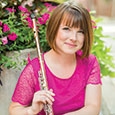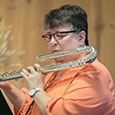Kelly Zimba is the newly appointed Principal Flute of the Toronto Symphony Orchestra. Previously a flute fellow at the New World Symphony, she has performed with the Pittsburgh and Detroit Symphony Orchestras and was a two-time fellow at the Tanglewood Music Center. Originally from Pittsburgh, Zimba completed her graduate studies at Rice University’s Shepherd School of Music, and received Bachelor’s degrees in Flute Performance and Music Education from the University of Michigan. She was a student in Wendy Webb Kumer’s Pittsburgh Studio from ages 13-18.
How did you prepare for your audition for the Toronto position?
While I started actively practicing for this audition a month in advance, my preparation truly began the day I picked up the flute as a nine-year-old. Many experiences shaped my playing and auditioning skills, from high school honors festivals to the 17 professional auditions I took before winning the TSO job. Auditions have become less scary and stressful, and preparing for each one improved my flute playing and overall confidence.
Starting about a month before the Toronto audition, I practiced each excerpt extremely slowly and in great detail. Sometimes, I would practice only four or five notes in a given selection until they were as secure as possible. This was much more effective than running excerpts over and over again. I knew that if I could have bulletproof technique, I would have more artistic freedom and expression and would be less likely to experience technical slip-ups. Only after this nitpicky work would I play excerpts in their entirety.
At the end of September 2016, I played the preliminary, semifinal, and final audition rounds. I performed with the orchestra a few months later for a one-week trial, which also included playing excerpts with the entire orchestra and then another individual audition directly after. At the end of an exciting but intense week, I was offered the job. As with most auditions, I believe that this result was a combination of hard work, many elements falling into place, and a lot of luck. There were many excellent flutists at the audition, and I feel extraordinarily honored to be entrusted with this position.
What was a typical season like with Miami’s New World Symphony?
The New World Symphony trains young professional musicians for orchestral careers. Bridging the gap between school and professional life, it performs different concert programs every week in Miami Beach from September until mid-May. Each member is offered a position for three years, and all players are encouraged to take auditions for permanent positions with the guidance of guest coaches who travel to Miami several times a year. It was inspiring to be around colleagues who were winning jobs left and right. This year, several former NWS members also won positions in the Toronto Symphony, and I am so happy that we will begin our first season together in September.
New World musicians also are involved in a wide array of community activities both in Miami and other locations. I traveled to Medellín, Colombia twice to work with a youth orchestra and to teach university students, and I also coached flute students in Miami’s public schools.
My best aspect of the New World Symphony was the opportunity to perform new repertoire every week under different conductors. While I was in school, I was accustomed to performing only three or four concerts per semester. Learning new repertoire more often and more quickly at NWS was certainly an adjustment at first, but it became easier, and I now feel more comfortable with this part of the job.
Does the NWS fund orchestral auditions?
No, but everyone is allowed three paid weeks off per year for audition purposes. This generally covered most, if not all, of my audition expenses, which was helpful given the high cost of auditioning. NWS also had an agreement with an airline that provided a 25% discount for audition flights. I used this several times.
How did you manage your audition budget?
Anyone on the audition circuit knows that this is an expensive job hunt, and I do have a few tips. First, look into travel credit cards that earn points and airline miles. When booking a flight, my favorite search engine is TripCombi. It finds more flight combinations than any other search engine I have tried. Another option is flying on Southwest Airlines (whose flights appear only on Southwest’s website), which allows customers to cancel flights and use funds for future travel. This is useful if an audition spans multiple days, and you want to cut down on hotel expenses. You can buy two tickets home – one for if you advance to the next day, and another for if you do not.
For hotels, I almost always use Hotwire or Priceline to find a discounted rate. I also love Airbnb, and I have been able to find a studio or one bedroom apartment for the same price or cheaper than a hotel. If you plan to fly home the day after an audition, split the last night’s room with a friend. If you stay somewhere with a kitchen, you can save money by making your own food and not eating at restaurants. It is best to find lodging somewhere along a public transportation route, especially if a metro line connects to the airport. If public transportation is not available, Uber and Lyft are your best options. Other deal hunting sites to check out are Groupon and LivingSocial.
Were you ever discouraged after taking so many auditions before landing your current position at the TSO?
Absolutely. When I first started auditioning, I never advanced. I did not know how to improve or understand the process. Eventually I started to see more success, but it was never consistent. I would make it to the finals in one audition and not advance in the next one. The first time I was in a final round, it was for what was my number one dream job at the time, and it did not work out. After arriving at New World, I fell into a bit of a funk where I never advanced past the preliminaries in any audition that I took. I thought that I might be regressing and emailed my former teacher, Leone Buyse, for advice. She responded with memories of her own audition experiences and assured me that progress in this field is not linear. She is so right.
Looking back, there is no way to analyze my audition track record. In some auditions, I felt that I played well but got nowhere. In others, I remember thinking that I should just leave before the results were announced only to find out that I had made it to the next round. For me the best thing was to completely detach myself from the outcome and stop worrying about factors I could not control. All I could do was prepare well, show up, and demonstrate my love of the music to the committee. Everything else was out of my hands.
How did you choose the flute?
My mom first introduced me to the flute when I was four years old when she was practicing to play in her sister’s wedding ceremony. Even at such a young age, I was instantly drawn to the sound. Growing up in Pittsburgh, I was surrounded by a large extended family that loved music – my grandfather taught elementary school orchestra while playing trumpet in a jazz band and tuning pianos, and my grandmother was an accomplished pianist and organist. Four of their eight children played the flute through high school, and eventually one of their instruments found its way to me. Because my grade school band program was limited, my mom was my primary teacher during this time. In my third year of playing, I had the opportunity to audition for a citywide honors band festival where I sat 16th out of 16 flutes. I was oblivious to the concept of chair ranking until the end of the first rehearsal when I realized I was last. This did not really matter to me as I was just so excited to be playing in a full ensemble for the first time. Shortly after, I started taking private lessons and entered a more robust band program in high school. That is when playing the flute became a higher priority for me.
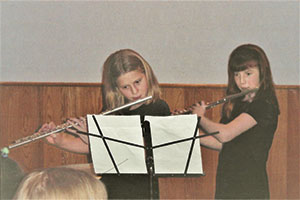
What were your high school musical experiences like?
My musical training was threefold. I primarily honed my flute skills at the Flute Academy of Pittsburgh (directed by Wendy Kumer). Here, I took private lessons, played in flute choirs, and took a few music theory courses. You were exceptionally gifted in knowing just how much to push me and helped me develop a raw, authentic musical voice before refining it too much. You also knew that I was on the fence about pursuing the flute and gently nudged me to record audition CDs for various festivals and programs.
In addition to the Flute Academy, I started playing in my church choir around age 13. This might seem like an unconventional place for significant music learning, but it provided a valuable opportunity to perform for a large audience each week. The choir directors never treated me like a kid, and the environment was professional. I learned to show up organized, prepared, and on time. I was able to experiment creatively with improvisation, which definitely fine-tuned my ears.
My high school music program was also chock full of terrific experiences. It was especially exciting for me because I had never been part of anything like it before. Both of my band directors were contagiously enthusiastic, and I loved being in the marching band and school musical pit orchestras. The program provided a great social outlet, too. My friends and I could collaborate together and encourage each other, not just musically but in all aspects of life. It was a lot of fun.
When did you decide to pursue a music career?
For most of high school, I did not anticipate becoming a professional musician. It was not until my junior year that I played in the PMEA All-State Orchestra and decided that music would be my career path. Admittedly, I was a bit apprehensive; I knew that I was a little fish in a big pond and that the music world was unbelievably competitive. I also knew that studying music professionally would be vastly different from playing for fun as I had been doing. After researching schools with the help of my teacher, I applied for flute performance and music education programs, ultimately enrolling at the University of Michigan to study with Amy Porter.
Why did you choose to pursue both flute performance and music education degrees?
I chose to pursue performance and education simply because both were available, and I wanted the best possible chance of securing a job upon graduation. Since I had just decided to study music the year before, I had not yet figured out exactly what I wanted to do and preferred to keep my options open. Plus, Michigan was strong in both and was one of the few universities that encouraged dual majors. I am not sure if it is still this way, but at the time, many of the schools I applied to preferred that students focus on only one of these fields. Michigan was an excellent fit for me in this regard.
There were plenty of advantages in taking up both majors. My music education coursework constantly improved my flute playing, and I became a better teacher the more I practiced the flute. In my first freshman music education class, I had to compile a list of creative practicing strategies for beginning music students. While the list was intended for ten-year-olds, it helped me examine and refine my own practice routine. Later, the education coursework further increased my overall confidence. Many of the assignments involved presenting different lesson plans to my peers in addition to public school students. This was a little uncomfortable for me at first, but I gained valuable experience speaking and playing in front of large groups for extended periods of time. This confidence transferred directly to performing.
During my last undergraduate semester, I was simultaneously student teaching and auditioning for graduate schools. Unexpectedly, I think this actually helped me audition more successfully. I figured that if I could get up and teach a sixth-grade brass class for an hour, playing a fifteen-minute flute audition would be no problem.
On the flip side, intense flute study has helped me become a more competent teacher. The more I practice and improve my own musicianship, the better I can help my students understand music. This is constant motivation for me. I believe that the best teachers are also the best players. If I can become a better musician, I will have more to offer my students.
Would you recommend a music education degree to prospective music students?
It depends. If you like playing but have no interest in teaching, there is no reason to obtain a music education degree. However, it is also important to consider the job market. There are more teaching jobs than there are orchestra jobs. Earning a flute performance degree does not guarantee an orchestral position. Many orchestral musicians also teach, so it might make sense to gain that kind of training in college. You also might discover an interest in teaching after taking a few classes or someday decide that you would like a teaching job that allows you more flexibility in choosing where to live or one with benefits. If you are accruing student loans, the potential of landing a solid teaching job immediately upon graduation may be very appealing.
Many students and teachers alike have concerns about practicing while juggling music education coursework. I worried about this, too. In addition to music education classes, I had to take a variety of elective and School of Education courses, attend conferences, and pass tests to meet the State of Michigan’s certification requirements. I cannot speak for everyone, but I can honestly say that I was able to practice the same amount during both my undergraduate and graduate studies. In fact, I might even have practiced more at Michigan than I did at Rice. It was crazy sometimes, but I found that I used my time more wisely when I was busier.
What were some of the challenges you faced due to medical problems?
I had a lot of trouble with my neck and shoulders, ironically not caused by flute playing, during my junior year of college. At one point, it was very difficult for me to hold the flute for more than a few seconds. My arms would become so tired, and it felt like the flute weighed fifty pounds. Physical therapy, Alexander Technique, and far too much worrying became part of my daily routine. Basically, I would have done absolutely anything to heal and put a lot of pressure on myself to do so. I took nine months off from flute playing and a semester away from school and eventually things got better – it just took much longer than I had anticipated. The break from school ended up being a positive experience for me, and I returned the following semester more prepared to hit the ground running than I ever had been.
Is there a particular remedy that you found most helpful?
It was a combination of factors. In the thick of it all, I learned that the mind-body connection is real. I was doing all of these physical exercises and ended up being in great physical shape, despite not feeling any better. I was really depressed. At the time, we knew a family friend who struggled with anxiety and various challenges who experienced profound relief from hypnotherapy. So, I made a last-ditch call to a hypnotherapist. I remember sitting in the waiting room feeling totally desperate, silently judging myself for being there. However, I was quickly sold upon seeing the woman whose appointment was before mine. She had apparently been suffering from extreme migraines for many years. Before her appointment, she was experiencing pain and nausea to the point where she had to ask the receptionist for water, crackers, and a place to lie down. After her appointment, she was a different person. She was in no pain and could not believe it. My own session lasted about two hours and I listened to a recording of it every day for about two months. I did not notice it at first, but my family immediately sensed that I was significantly calmer. This was definitely a turning point in my recovery. Since returning to flute playing in the winter of 2012, I have experienced nothing resembling this brief episode.
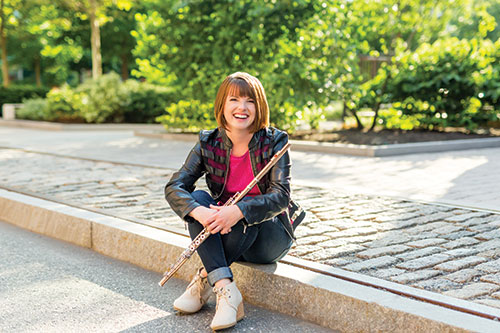
How did these difficulties influence you?
I realized that my flute playing was too intertwined with my identity. When I could not play, I felt like a huge part of me was gone and that I was less valuable as a human being. It was a dark time. Fortunately, I learned to focus on things that matter much more than the flute and developed a healthier identity, independent of my skills and productivity.
This process also showed me how quickly circumstances can change. In May 2011, I toured China with the University of Michigan Symphony Band right before I took the semester off from school. At the end of the tour, I remember thinking, “this is probably the last time I am going to play in a concert.” It was devastating. However, less than one year later, I performed my senior recital and toured Chile with the YOA Orchestra of the Americas. Although I could not see it at the time, there was light at the end of the tunnel. I have learned to be okay with not knowing exactly how everything is going to turn out, and it has been an invaluable lesson for me.
How do you approach practicing?
My warmups vary depending on what I am currently playing. Usually, I try to incorporate whatever repertoire I am working on into my warm-up routine. This was especially beneficial when preparing for auditions, since it is more efficient.
Take the flute solo from the fourth movement of Brahms’ Symphony No. 4, for example. You can build an entire tone warm-up from this excerpt. If you want to begin with middle register refinement, start in measure 95. The downward scale from mm. 91-94 provides an opportunity to improve overall smoothness, finger coordination, and consistency in tone color. To effortlessly reach the high F# in measure 101, you can practice the harmonic series beginning on a low B. Evenness in tone color between registers can also be a focus, especially as the passage descends into the lower register after measure 101. Practice all of the intervals slowly, especially the descending ones, to avoid blips between the notes.
Brahms, Symphony No. 1 (flute solo)
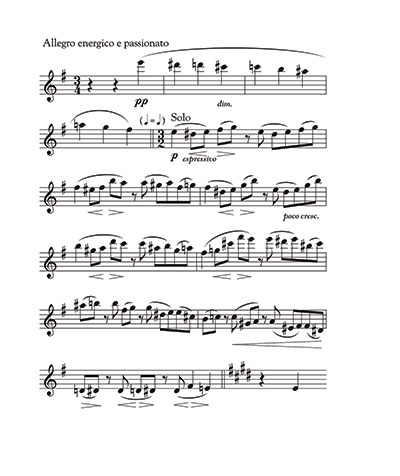
There are plenty of warm-ups you can create with the repertoire you already own.Two general concepts that I try to balance are intense focus and letting go. When I am actively working to improve a passage, I think analytically about why something sounds the way it does. This usually illuminates what I should do to make it better. After woodshedding for a while, I put the passage aside and return to it later with a less critical approach. I have a tendency to over focus, and this prevents me from doing that.
Do you teach currently?
I focus on performing during the academic year and spend more time teaching in the summers. For the past two summers, I have taught elementary general music, flute masterclasses, and woodwind chamber music at the Sitka Fine Arts Camp in Alaska. Sitka is a quiet fishing town on Alaska’s inside passage – it is the fourth largest city in the state, boasting a population of 9,000. For many students, SFAC is their only opportunity all year to participate in the arts. This resonates with me. One of the Sitka high school flute students traveled all the way from Unalakleet, a subarctic village located along the Bering Sea, to study music. This year, she was the first person in the history of her school selected for the Alaska All-State Band. Learning from her and all of the students there is fascinating; I probably learn more from them than they do from me.
In August I coached adult chamber music at the Toronto Summer Music Festival’s Community Academy. It was my first official activity as a member of the TSO and a great introduction to Toronto’s wonderful musical community. Seeing so many people devote a week of their summer to playing chamber music just for the love of it was quite inspiring. I worked with emergency room doctors, engineers, lawyers, and people in all kinds of professions. Teaching is such a rewarding challenge, and I hope to be able to do more of it in Toronto.
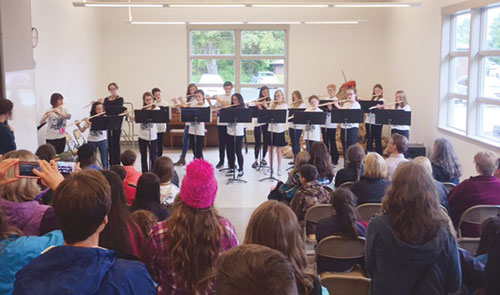
Sitka Fine Arts Camp 2017 Middle School Flute Class Performance
What advice do you have for those hoping to become professional flutists?
I think the key to success lies in having a clear, continuously evolving long-term vision for yourself, including a detailed plan of action and an inherent awareness of where you are in relation to your goals. It is not enough to say, “I want to play the flute in an orchestra” and hope that it works out. If you do not already, listen to recordings and attend live performances so you have strong concepts of sound, phrasing, and technique to work toward. These will become your long-term playing goals – keep them at the forefront of your mind every time you practice. Next, it is helpful to devise a practice plan. Find exercises for breathing, tone development, vibrato, phrasing, and technique, and learn appropriate repertoire with the guidance of a private teacher. It is important to think critically. For example, as a middle school student, I remember having a specific tone quality in my head that I wanted to emulate. Never could I match it at that age, but every once in a while, one note had some semblance of this sound. I would recognize it and think, “what did I do differently to make this note sound better?” and then tried to replicate it. When applied to every facet of my playing, this experimentation propelled me forward, and it is how I approach practicing today.
As your daily practice becomes more in line with your overall vision for your flute playing, you can begin to think more broadly about career goals. In college I applied to summer orchestra festivals, read articles about pedagogy, and observed what my colleagues were doing. Everyone in my undergraduate flute studio had something special in his or her playing that I strove to emulate. I started learning about professional auditions and would play mock auditions to prepare. If you are in high school, you might want to research summer camps or opportunities to play in youth orchestras. I would also suggest talking to professional flutists about their careers and seek their advice. At every stage of development, it is crucial to gauge your current standing against your projected vision. Honestly ask yourself, “Am I getting closer to where I want to be? Do I still have a clear idea of where I’m going? Am I willing to do what it takes to get there, and is it worth experiencing setbacks along the way?” If you can confidently answer yes to all of these questions, you are probably on the right track.
* * *
Preparing for an Orchestral Audition
• Collect all of the required excerpts and put them together in a binder.
• Listen to multiple recordings of each excerpt on the list. Be familiar with the entire piece and what the rest of the orchestra is doing during the flute solos.
• Invest time in very detailed work – this will pay off in the long run.
• Play mock auditions for teachers, friends, and colleagues, and be open to their feedback.
• Record yourself, but also train to analyze your playing in real time.
Audition Day Advice
• From the moment you arrive at the hall, your preparation is done. Depart from practice mode and get ready to perform!
• For the most part, I warm up by playing long tones and melodies that I enjoy. This helps me keep calm.
• You might see and hear many other people warming up. Resist the temptation to be intimidated or influenced by any of it. Be kind to every flutist you see.
• If the audition is screened, wear what makes you comfortable. I almost always wear jeans and tennis shoes, but others prefer to dress formally. Choose what feels best for you.
• Try to distance yourself from the outcome. The worst that can possibly happen is that you don’t advance, and life continues.
Advice for Flute Majors
• Look to fellow studio members as role models and treat them with respect. Be a supportive colleague and attend all of their recitals and performances.
• Show up to all lessons prepared and open to your teacher’s ideas. If you can, record lessons and take notes later.
• Strive to be your personal best, not better than anyone else.
• Learn to budget your time wisely. College is a huge adjustment, and what worked well in high school may no longer be effective.
• Avoid speaking negatively about other flutists (or people in general). Besides it being in poor taste, you never know who might be on your future audition or search committee.
